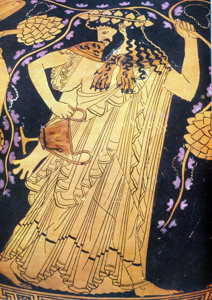Andros is a rare Cyclades island abundant with water. It nurses dense forests, lemon groves, plane trees and rare flora. Andros accommodates mountain ranges, ravines, valleys and plateaus, and numerous cultural sites like one of the world’s most impressive maritime villages, ancient cities, Hellenistic age towers, churches and others.
Walk around Hora ( that's how many Greek islands' capitals are called), a maritime village with mansions of noble captains, maritime museums, sailor statues, seafarers protecting churches, and shipping manuscripts.
Find the medieval castle of Kato Kastro at the end of the peninsula.
Behold the Tourlitis Lighthouse - the only lighthouse worldwide built on a rock in the sea!
Do not miss the church of Panagia Theoskepasti which sits on top of a hill. Locals believe the icon of Virgin Mary came to the cave by itself and the roof was built by God.
Enjoy artworks of Picasso, Matisse, Karagatsi, Nikolaidis and Tsarouhis in the Goulandris Museum of Modern Arts.
Meet “The old Lady’s Jump” and “The old Lady’s castle”, that is how locals call a narrow rock standing in the sea on Tis Grias to Pidima beach and a nearby castle of Pano Kastro (Tis Grias to Kastro).
View the remnants of the market, theatre, sunken agora and pier in the ancient capital Paleopolis. Catch the sunset here from the church of Agios Ioannes.
Take worldclass award-winning hiking trails, crisscrossing the entire island. Most of them are old cobblestone main roads for locals.
Hike up to the greenest village of the Cyclades – Apikia. Drink from Sariza springs (this water is bottled and goes all over Greece), and watch Pithara waterfalls and Byzantine churches.
Follow the path through Ravine of Pithara to see rare species of birds, plants and wild flowers.
Hike among the traditional villages of Paleokastro with stone houses, cobbled paths, flowery gardens, climbing vines, windmills, chapels. Here you can enter the oldest church of Andros – Church of Agios Ioannis Theologos.
Enjoy nature in the valley of Dipotamata, a declared ecological site of Europe, with springs both scenic and therapeutic.
Reach the Stenies village – a true specimen of Cyclades architecture. It is embellished with captain mansions, wall fountains and a deserted pasta factory.
Trek to Dionysus spring, flowing from the lion head and try its therapeutic waters. Enjoy the surrounding landscapes of fountains and old trees of Menites.
Observe the Aegean from the Tower of Agios Petros – one of the best preserved towers of 3-4th centuries BC, defeating pirates.
Explore the Cave of Foros, a large 200 square meters cave with stalactites and stalagmites.
Choose Andros if you travel on Easter to contemplate solemn celebrations: liturgies at churches, processions on the alleys and fireworks. Crack red eggs, eat “lazarakia” and watch cannon explosions.
Surf! Andros is so good for windsurfing it even hosts the International Race.
Choose from more than 100 beaches of Andros to relax. Most of them are long and sandy, some are vibrant like popular Agios Petros, and others are secluded.
Go for mountain biking and off-road driving. Andros boasts numerous paths of extreme wild beauty, thus feel free to take our mountain bikes.
Savour local specialties: fourtalia (omelette with cheese, potato and sausage), labriatis (Easter dish of marinated stuffed goat) and kaltsounia (sweet made with honey).
According to mythology Cyclades islands, including Andros, are nymphs transformed by the god of sea Poseidon, when they angered him.
The island is considered to get its name from the first king Andros, son of King Anius of Delos. Andros was a hero-oracle, given the power of augury by Apollo.
Anius ransomed his wife Dorippe for the price of a horse from the pirates who had kidnapped her. And they had three daughters: Oeno, Spermo, and Elais, and three sons: Andros, Mykonos, and Thasos. Sons gave their names to the islands they ruled. Daughters are known as the Oenotropae, because they were bestowed powers by Dionysus to change whatever they wanted into wine (for Oeno) , wheat (Spermo), and oil (Elais).
Islanders favored god Dionysios with a great celebration in his honor where "water was turned to wine".
Other historical names of the island are Hydroussa, Nonagria and Lasia, all homage to the rich flora and water springs.
